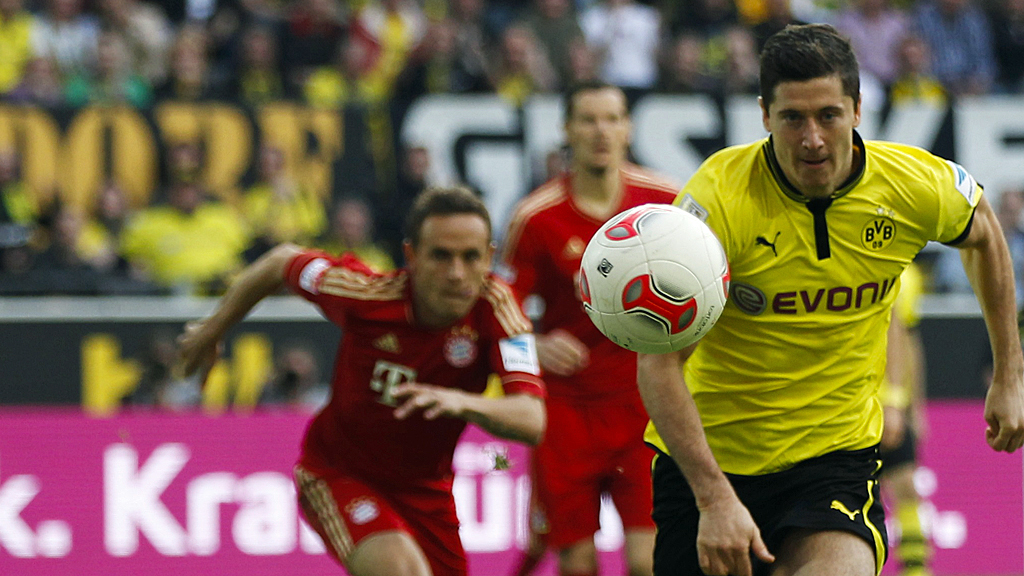German football: playing the perfect game?
With Bayern Munich and Borussia Dortmund contesting club football’s top prize this weekend, Germany’s football set-up is being cited as the model for other countries. But is it really that good?

We’ve been hearing for the past 18 months about how German football has been living up to its reputation as, well, very German: efficient, organised, methodical, financially self-sufficient, and all done with the support of home-grown talent and business, writes Jordan Jarrett-Bryan.
If it wasn’t bad enough that they seem to have the scientific solution for winning penalty shoot-outs, we’re now being told our very own domestic game could and should be looking to the Bundesliga as the model for ensuring club, and then national, success.
If it wasn’t bad enough that Germany has the solution for penalty shoot-outs, we’re now told our game should be looking to the Bundesliga.
Germany has produced the likes of Jerome Boateng, Thomas Muller and Mesut Ozil in the last five years. They all came through the U-21 side to become established German internationals playing for top European clubs. And with Mario Gotze transferring to Bayern Munich from Borussia Dortmund for a national record transfer fee, top players don’t appear to be in any hurry to leave Germany and come to the Premier League or La Liga. In fact the contrary.
Meanwhile, former Barcelona manager Pep Guardiola, one of the hottest properties in football management, will this summer be taking up the reins at Bayern Munich, the possible European champions. I wouldn’t be surprised if he cherry-picks some of the best talent from the Spanish and English leagues.
And with German ticket prices, fan involvement in club ownership, and integration of young players within top sides, all being held up as the model for clubs elsewhere, we must ask: could the Bundesliga be the perfect league?

Tax scandal
Well, no, not really. Uli Hoeness. Bayern Munich’s business manager, is embroiled in a tax scandal. In Germany the story is making more news than any of the football being played. The implications, should he be found guilty of any wrongdoing, could be huge for not only him but for Bayern, the club held largely responsible for the state of German football.
Just days after the Hoeness story broke, the nation’s hottest property in football, Dortmund’s Mario Gotze was signed by Bayern for £31m – further proof that these two clubs clubs are in a league well beyond the rest of the country.
Germany’s model is great. And it works for them. But the mass love-in with their league is slightly premature.
Yes, you could say Dortmund have been bringing through players from the youth academy in recent years. Bayern, on the other hand, have splashed over 200m euros on players since 2009, with Dortmund coach Jurgen Klop fearing “Scottish conditions” in which the league is dominated by just one team.
As for ticket prices, maybe the entry fee to see a top game in Germany is significantly less than in the Premier League, but it comes back round like a boomerang when you’re paying low fees for a game at the bottom end. Have you seen the quality of the games between the bottom clubs in the Bundesliga? You soon realise why the tickets are so cheap.
Germany’s model is great. And it works for them. But the mass love-in with their league is slightly premature. Yes, it is a proud achievement for them to have two teams contesting the Champions League final on 25 May. But Italian and English clubs have done the same in the last decade. The yardstick of success in business is longevity – so let’s review German football in five or so years.
-
Latest news
-
‘It’s absolutely clear that these advances were unwanted,’ says producer of new Channel 4 Spacey documentary4m

-
India opposition accuses government of ‘crackdown’ as election gets under way2m

-
Sadiq Khan wins historic third term as London mayor2m

-
Labour’s Andy Burnham re-elected as mayor of Greater Manchester4m

-
Andy Street ‘winning or nearly winning’ is an extraordinary result for Tories, deputy foreign minister says4m

-




